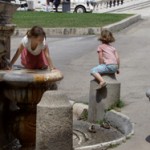Siblings
Being one of five children, and the youngest, I understand the positives of having siblings, as well as the difficulties. In my practice, I listen to parents who are frustrated with sibling rivalries and how disruptive it is to the family harmony. There are several ways to understand what being a sibling means.
The traditional birth order psychology suggests the oldest child is generally the trailblazer. They tend to be more independent, more self-nurturing and sometimes used to getting their own way because as an only child it is their only experience. The youngest child generally matures faster but often times, because of being the baby, is used to getting their way. Of course, there are numerous overriding factors in any sibling birth orders structure. One such factor is a sibling having a serious illness as a child. Because this child can take up so much time and energy out of necessity, the other children feel guilty for having angry feelings about not getting more attention. The other factor is that some siblings just seem to become better friends and three is too much company. I would encourage all parents not familiar with the psychology of birth order of siblings to do a little reading.
We cannot choose our families and oftentimes we are so much alike in our personality characteristics that as children we disagree and compete with our siblings. Age difference, or spacing, between children can make a great deal of difference and help older ones feel special long enough that when the next one comes along, the older one can appreciate the new child without feeling threatened. Studies have shown the ideal spacing is 3-1/2 to 4 years between children. However, as we all know, sometimes planning can go awry and accidents happen.
The important part is that parents have the responsibility to set the path for siblings early while they are very young. For example, when a new baby comes and everyone is bringing gifts for the new baby, bringing a small toy for the older child will help soothe anxieties and misgivings by the older one about the new arrival. As the two grow older, when there are activities for one, involving the other such as being in the audience and cheering is important for the solidifying sibling bonding. Teaching your children to share with one another is equally as important as not favoring one child over the other (bigger room, more toys, etc.) Each child should have their own success as they grow and mature. One child can play basketball while another may prefer to play the violin. Encourage each child to be the best they can be because as a parent you just want each child to find their contentment.
As people become adults and take on their own responsibilities, life can get in the way of better communication between siblings so it does take effort to organize gatherings at holidays and special occasions. Giving children a sense of their extended family of cousins and aunts/uncles is about creating a village to raise them to become well-adjusted people.
Nurturing these relationships through their adult lives will also keep these relationships going when the parents are gone. It is later in life when siblings oftentimes find themselves missing their brothers/sisters and wanting to reconnect. Maybe there will be some disagreements or hot topics, like politics, for which it is best to agree to disagree for the sake of being a family. Even later in life, our siblings can be a source of love and comfort in times of need.







